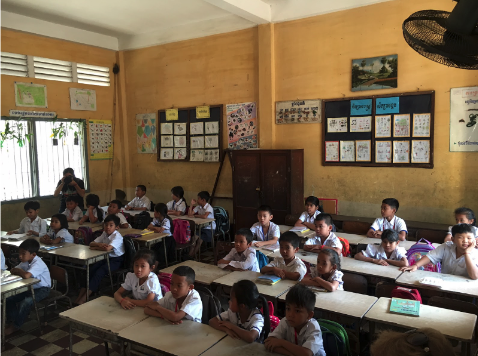In this interview, our Editor Sieon Lau (SL) talks to Khlaing Reaksmeypich (KR) and discusses the unique challenges faced by teachers of English in Cambodia.
 |
Khlaing Reaksmeypich About ACE (Cambodia) |
SL: What qualifications do people need to become English teachers in Cambodia?
KR: People who want to teach at primary school have to finish their grade twelve before taking a teacher selection test and a two-year long training. They can then be awarded the official license to become primary school teachers. For secondary teachers, the process is the same but the test is different: a bachelor degree in the relevant field is mandatory, but usually the training is only one year long after passing the selection test.
SL: What challenges do you and your fellow Cambodian teachers face?
KR: First of all, we still don’t have enough teaching materials. Sometimes the schools do not have the budget for us to make photocopies (for worksheets, homework, etc.) and teachers are kind enough will make photocopies themselves. However, not every teacher can afford to do this, and the cost is transferred back to the students. This problem is especially frequent in the provinces where students are not financially capable or just not motivated to learn because of various difficulties they see in gaining an education. Some still say paying money for papers is useless, and would much rather spend their money on something else.
Plus, there is not enough professional development, I guess, especially for the teachers in the provinces. They do not have the chance to attend teaching training in order to develop themselves.
Finally, at least for my generation, people in Cambodia just don’t have a strong culture of independent learning. Things were different back in the warring days and it was difficult for people to receive a proper education. You may have heard that during the war, people could be sentenced to jail or fined if they were caught learning a foreign language. With all that said, however, young people nowadays are a lot more open to learning a foreign language and independent learning.

SL: What resources do students have for independent learning?
KR: Normally public schools are like the photo [above], but universities around the country tend to have sponsors, as they have close relationship with countries like France and Australia so they have better facilities. There is also private funding for universities. If you go to a private university in Phnom Penh, the facilities are even more advanced, and of course they attract a lot more students. However, I would say most of the resources there are paper-based: mostly books and not a whole lot of computers around.
SL: I see almost every young person in Phnom Penh has a smartphone. Do they use them for learning English?
KR: Yes. Nowadays on their smart phones people have at least one dictionary—English-Khmer, Khmer-English or English-English, which can help them searching for the right words to use either in speaking or writing. Some people have installed educational applications to their phones as well, ranging from alphabets to idioms or grammar. Learning materials on smart phones would attract students’ interests due to the convenience and advance of technology.
SL: How about the future?
KR: Advancement in technology is very important for all levels of English proficiency. Students can be more independent, and have access to a wealth of information — anything they want to know. Cambodian students now have their horizons broadened and get exposed to the world outside Cambodia. However, if they only look at the available technologies in the social and entertainment aspects, I don’t think these will be much use for us local teachers.
So I will say the foundation is there, but more work is needed to help students develop their learning strategies.
You can contact Ms. Khlaing Reaksmeypich at: reaksmeypichkhlaing@gmail.com
